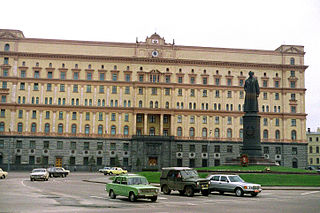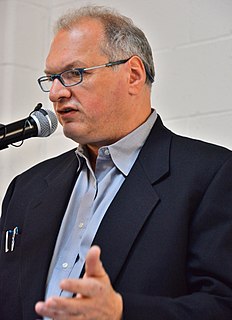
Yuri Vladimirovich Andropov was the sixth paramount leader of the Soviet Union and the fourth General Secretary of the Communist Party of the Soviet Union. Following the 18-year rule of Leonid Brezhnev, Andropov served in the post from November 1982 until his death in February 1984.

The Federal Security Service of the Russian Federation is the principal security agency of Russia and the main successor agency to the Soviet Union's KGB; its immediate predecessor was the Federal Counterintelligence Service (FSK) which was reorganized into the FSB in 1995. The three major structural successor components of the former KGB that remain administratively independent of the FSB are the Foreign Intelligence Service (SVR), the Federal Protective Service (FSO), and the Main Directorate of Special Programs of the President of the Russian Federation (GUSP).

The Russian apartment bombings were a series of explosions that hit four apartment blocks in the Russian cities of Buynaksk, Moscow and Volgodonsk in September 1999, killing more than 300, injuring more than 1,000, and spreading a wave of fear across the country. The bombings, together with the Invasion of Dagestan, triggered the Second Chechen War. The handling of the crisis by Vladimir Putin, who was prime minister at the time, boosted his popularity greatly and helped him attain the presidency within a few months.

Active measures is political warfare conducted by the Soviet or Russian government since the 1920s. It includes offensive programs such as disinformation, propaganda, deception, sabotage, destabilization, subversion, and espionage. The programs were based on foreign policy priorities of the Soviet Union.

Chekism is a term to describe the situation in the Soviet Union where the secret police strongly controlled all spheres of society. It is also used by critics of the current Kremlin authorities to describe the power enjoyed by law-enforcement agencies in contemporary Russia.

On 7 October 2006, Russian journalist, writer and human rights activist Anna Politkovskaya was shot dead in the elevator of her apartment block in central Moscow. She was known for her opposition to the Chechen conflict and for criticism of Vladimir Putin. She authored several books about the Chechen wars, as well as Putin's Russia, and received numerous international awards for her work. Her murder, believed to be a contract killing, sparked a strong international reaction. Three Chechens were arrested for the murder, but were acquitted. The verdict was overturned by the Supreme Court of Russia and new trials were held. In total, six people were convicted of charges related to her death.

Yuri Petrovich Shchekochikhin was a Soviet and later Russian investigative journalist, writer, and liberal lawmaker in the Russian parliament. Shchekochikhin wrote and campaigned against the influence of organized crime and corruption. His last non-fiction book, Slaves of the KGB, was about people who worked as KGB informers.
Maxim Yuryevich Lazovsky was a KGB and FSB officer who became involved in underground business. According to Alexander Litvinenko and co-authors he was also suspected of participation in Russian apartment bombings in 1999, along with other crimes including murders and kidnappings.

Yuri Georgievich Felshtinsky is a Russian American historian. Felshtinsky has authored a number of books on Russian history, including The Bolsheviks and the Left SRs, Towards a History of Our Isolation, The Failure of the World Revolution, Blowing up Russia, and The Age of Assassins.
Vladimir Valerianovich Pribylovsky was a Soviet and Russian political scientist, historian, journalist, human rights activist, and author of internet database Anticompromat.org on biographies of Russian politicians. He also authored more than 40 books.

Viktor Vasilyevich Zolotov is the current Director of the National Guard of Russia (Rosgvardiya) and a member of the Security Council of Russia.
Yury Titovich Shutov was a Russian politician who is known for collecting incriminating evidence against Saint Petersburg administration, including former Mayor Anatoly Sobchak and his aide at this time Vladimir Putin. Shutov was convicted to life in prison on criminal charges that have been allegedly fabricated to punish him for making public accusations of Putin.

Sergei Mikhailovich Smirnov is a retired Russian intelligence officer whose career ended with a seventeen-year stint as First Deputy Director of the Federal Security Service (FSB). He was made a General of the Army in 2006.

Yevgenia Markovna Albats is a Russian investigative journalist, political scientist, writer and radio host. As of 2022, she works as a chief editor of The New Times magazine.
Achemez Gochiyayev is a Russian citizen who was accused of organizing the Russian apartment bombings, a series of terrorist acts in 1999 that killed 293 people and led the country into the Second Chechen War. The five bombings took place during two weeks between September 4 and September 16, 1999, in Moscow, and the southern towns of Buynaksk and Volgodonsk. Gochiyayev has not been arrested or convicted and ostensibly remains a fugitive; he has not been seen since early March 2002.

Filipp Denisovich Bobkov was a Soviet and Russian KGB functionary, who worked as the chief of the KGB subunit responsible for repressing dissent, which was responsible for suppression of internal dissent in the former Soviet Union. He was widely regarded the chief KGB ideologist or "KGB brain".

Counterintelligence state is a state where the state security service penetrates and permeates all societal institutions, including the military. The term has been applied by historians and political commentators to the former Soviet Union, the former German Democratic Republic, Cuba after the 1959 revolution, Iraq under Saddam Hussein, China, and post-Soviet Russia under Vladimir Putin, especially since 2012.
Federal Governmental Institution — penal colony № 2 with special conditions of economic fctivity of the main directorate of the Federal Penitentiary Service of Russia in Perm Krai, popularly known as White Swan, is a prison in Solikamsk, Perm Krai, Russia. It is one of the seven maximum-security supermax prisons operated by the Federal Penitentiary Service for convicts sentenced to life imprisonment in Russia.

Putinism is the social, political, and economic system of Russia formed during the political leadership of Vladimir Putin. It is characterized by the concentration of political and financial powers in the hands of "siloviks", current and former "people with shoulder marks", coming from a total of 22 governmental enforcement agencies, the majority of them being the Federal Security Service (FSB), Ministry of Internal Affairs of Russia, Armed Forces of Russia, and National Guard of Russia. According to Arnold Beichman, "Putinism in the 21st century has become as significant a watchword as Stalinism was in the 20th."
The Academy of Foreign Intelligence is one of the primary espionage academies of Russia, and previously the Soviet Union, serving the KGB and its successor organization, the Foreign Intelligence Service. It was attended by future President Vladimir Putin during the 1980s.














